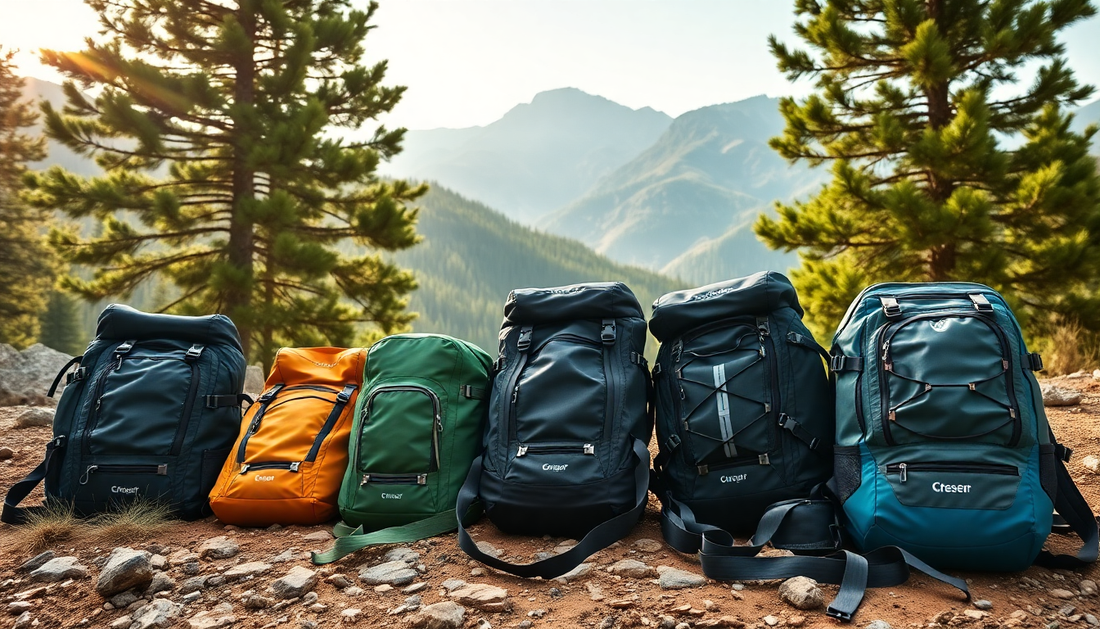
How to Choose the Best Camping Backpack for Your Outdoor Adventures
Share
Embarking on outdoor adventures is an exhilarating way to connect with nature and challenge yourself. But the key to a successful and comfortable trip often lies in the gear you choose to bring along. When it comes to camping and hiking, your backpack is arguably the most important piece of equipment you'll need. Selecting the right camping backpack can make all the difference in the comfort and enjoyment of your journey.
At CampInMeeIhie, we're passionate about helping adventurers find the perfect gear to fuel their explorations. In this comprehensive guide, we'll walk you through the essential factors to consider when choosing the best camping backpack for your outdoor adventures.
Understanding Backpack Types
The first step in selecting a camping backpack is understanding the different types available. There are two main categories to consider:

Daypacks
Daypacks are smaller, lightweight backpacks designed for shorter day hikes or quick outdoor excursions. They typically have a capacity of 20-35 liters and are well-suited for carrying essentials like water, snacks, and extra layers. Daypacks are a great choice for those embarking on day trips or exploring local trails.
Multi-day Backpacks
For longer camping trips or extended wilderness adventures, you'll want to invest in a multi-day backpack. These larger packs range from 40 to 80 liters in capacity and are designed to carry all the gear you'll need for an overnight or multi-night stay. Multi-day backpacks often feature more advanced suspension systems and organizational compartments to distribute weight and keep your essentials accessible.
When selecting the right size, consider the length of your trip and the amount of gear you'll need to bring. A good rule of thumb is to choose a backpack with 10-20% more capacity than you think you'll require. This allows for a bit of flexibility and ensures you have enough room for unexpected items or souvenirs.
Key Features to Consider
Once you've determined the appropriate backpack type, it's time to dive into the specific features that will make your outdoor adventures more comfortable and efficient. Here are some of the most important factors to keep in mind:
Material Durability
Camping backpacks need to withstand the rigors of the great outdoors. Look for packs made from high-quality, abrasion-resistant materials like nylon or polyester. These fabrics will hold up better to wear and tear, ensuring your backpack lasts for many adventures to come.
Weight
The overall weight of your backpack is crucial, especially when you'll be carrying it for extended periods. Opt for a lightweight design that won't weigh you down unnecessarily. Advanced suspension systems and the use of modern, lightweight materials can help reduce the overall heft of your pack.
Comfort and Fit
Comfort is paramount when it comes to camping backpacks. Look for packs with padded shoulder straps, a well-designed hip belt, and a breathable back panel to minimize chafing and distribute weight evenly. The right fit is also essential - make sure to try on backpacks and adjust the straps to find the most comfortable and supportive option for your body.
Water Resistance
Unpredictable weather is always a possibility when exploring the great outdoors. Choose a backpack with water-resistant or waterproof fabrics to keep your gear dry, even in the event of unexpected showers or river crossings.
Storage Compartments
Organizational features like multiple pockets, compartments, and attachment points can make a big difference in the functionality of your backpack. Look for designs that allow you to easily access and stow your essentials, from water bottles to first-aid kits.
Matching Backpacks to Adventure Types
Not all camping backpacks are created equal. Certain features and designs are better suited for specific types of outdoor activities. Consider the following guidelines when selecting your pack:
Hiking
For day hikes or short overnight trips, a 40-50 liter backpack with a lightweight, streamlined design is often the best choice. Look for packs with comfortable suspension systems and easy-access pockets for snacks, water, and other essentials.
Overnight Camping
When you'll be carrying all your camping gear for an overnight or multi-night trip, a 50-65 liter backpack is typically the ideal size. These larger packs offer ample storage space and more advanced features like sleeping bag compartments and hydration system compatibility.
Extended Wilderness Trips
For extended backcountry adventures or thru-hikes, you'll want a high-capacity backpack in the 65-80 liter range. These larger packs are designed to carry heavier loads comfortably, with features like robust suspension systems and multiple access points to keep your gear organized.
Top Considerations for Comfort
Comfort is crucial when it comes to camping backpacks. After all, you'll be carrying your pack for hours on end, often over uneven terrain. Here are some of the top factors that contribute to a comfortable backpacking experience:
Strap Design
Well-padded shoulder straps and a supportive hip belt are essential for distributing the weight of your pack evenly. Look for adjustable straps that allow you to customize the fit for your body.
Back Panel Ventilation
Backpacks with breathable, mesh-lined back panels can help minimize sweating and keep you cool, even on hot, strenuous hikes.
Hip Belt Functionality
A sturdy, well-designed hip belt is crucial for transferring the majority of your pack's weight to your hips, rather than your shoulders. Ensure the hip belt is padded and adjustable for the best fit.
Budget and Value
Camping backpacks come in a wide range of price points, from budget-friendly options to premium, high-performance designs. When it comes to selecting the right pack, it's important to find the right balance between cost and value.
While you don't necessarily need to invest in the most expensive backpack on the market, it's generally worth spending a bit more to ensure you get a durable, comfortable, and functional pack that will last for many adventures. Look for quality construction, thoughtful features, and a brand with a reputation for reliable outdoor gear.
Maintenance and Care Tips
To extend the lifespan of your camping backpack, it's important to properly maintain and care for it. Here are some tips:
Cleaning
Wipe down your backpack with a damp cloth after each use to remove dirt, sweat, and other debris. Avoid machine washing, as this can damage the fabric and suspension system.
Storage
When not in use, store your backpack in a cool, dry place. Stuff the pack with crumpled paper to help it maintain its shape.
Extending Lifespan
Regularly inspect your backpack for any signs of wear or damage, such as frayed straps or rips in the fabric. Address minor issues promptly to prevent them from becoming larger problems.

Conclusion
Choosing the right camping backpack is an essential step in planning your outdoor adventures. By considering factors like backpack type, key features, comfort, and budget, you can find the perfect pack to carry you through your next hiking, camping, or wilderness excursion.
At CampInMeeIhie, we're dedicated to helping adventurers like you gear up for unforgettable experiences in nature. Browse our selection of top-quality camping backpacks and outdoor essentials, and let us know if you have any questions – we're here to help you find the perfect fit for your next journey.
